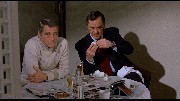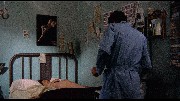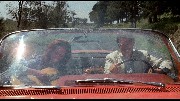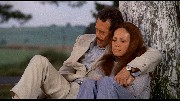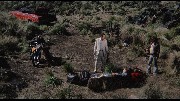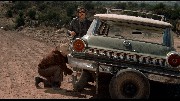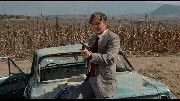Bring Me the Head of Alfredo Garcia (1974), Sam Peckinpah: Man of Iron (1993) 2 x Blu-Ray Arrow Video Limited Edition
on September 13th, 2018 at 02:50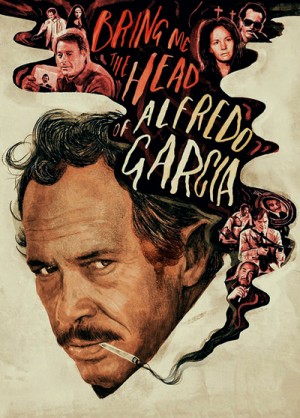
Bring Me the Head of Alfredo Garcia concluded a remarkable period for filmmaker Sam Peckinpah. It brought to an end a seven-year and seven-film run of masterpieces that included the taboo-breaking ultra-violence of The Wild Bunch and Straw Dogs, and the more elegiac tones of The Ballad of Cable Hogue and Junior Bonner. A love story that plays out in a brutal environment, Bring Me the Head of Alfredo Garcia sits somewhere between these moods and may just be Bloody Sam’s greatest work, as well as his most autobiographical.
The film centers on Bennie (Warren Oates, The Wild Bunch), a retired U.S. Army Officer who now works as a piano player and saloon manager in Mexico City. One day, Bennie encounters a pair of well-dressed Americans who are looking for a man named Alfredo Garcia. It seems this Garcia impregnated the daughter of a wealthy Mexican crime lord, and now has a large bounty on his head. Bennie pays a visit to Garcia's girlfriend – a prostitute named Elita (Isela Vega, The Yellow Rose) – and learns that Garcia died in a car accident a few days earlier. Recognizing an opportunity to make a little money and improve his status in life, Bennie strikes a deal with the Americans: $10,000 in exchange for Alfredo Garcia’s head.
The task seems easy enough: join Elita on a road trip to visit Garcia’s grave, dig up the body, retrieve the head and collect the money. Alas, this is a Peckinpah movie, so it won't be quite that simple. The journey is filled with betrayals, violent encounters and unexpected moments of emotional conflict, slowly evolving from a simple mission into a fight for survival into a bizarre journey of soul-searching.
Limited Edition also includes:
Sam Peckinpah: Man of Iron – The Director's Cut, A brand-new, extended version of Paul Joyce’s documentary, containing more than TEN HOURS of previously unseen interview footage, featuring actors RG Armstrong, James Coburn, LQ Jones, Kris Kristofferson, Ali MacGraw and Jason Robards, director Monte Hellman, producers Michael Deeley and Daniel Melnick, writers Alan Sharp and Jim Silke, writer-producer Gordon Dawson, assistant Katherine Haber, editor Garth Craven, satirist Mort Sahl, property master Bob Visciglia, bar owner Tom Runyon and cousin Bob Peckinpah, plus newly-shot interviews with Joyce, Haber and actor David Warner.

2 x BD50 | 1080p AVC | 01:52:18 | 88.4 Gb + 3% rec
Language: English
Subtitles: English
Extras:
DISC ONE contains the film and the following extras:
• An audio commentary with Stephen Prince. In this new audio commentary by Stephen Prince, the author of Savage Cinema: Sam Peckinpah and the Rise of Ultraviolent Movies (1998), Prince begins by suggesting that this film is the ‘purest’ Peckinpah picture but not the best, and he reflects on the ways in which the film’s fortunes amongst both critics and fans have changed in the years since its first release. He discusses some of the symbolism within the film in detail and comments on the context of the film’s production – for example, discussing how Peckinpah’s films changed the paradigms of editing in American cinema. It’s a breathless and well-research commentary track.
• An audio commentary with Paul Seydor, Garner Simmons and David Weddle. Here, Seydor, Simmons and Weddle are featured in a commentary moderated by Nick Redman. The three authors of the essential books about Peckinpah offer a variety of insights into the film, sometimes with a conflict of opinion. It’s a great commentary track that engages with the film, exploring the extent to which it may be taken as a metaphor for Peckinpah’s relationships with the filmmaking process. The commentary has appeared on previous home video releases of the film, beginning with the MGM DVD released in the US in 2005.
• Sam Peckinpah: Man of Iron (94:14). This extraordinary feature-length documentary about Sam Peckinpah was first broadcast on BBC2 in 1992. The documentary was made by Paul Joyce, who managed to get access to many of Peckinpah’s colleagues and friends, gaining an extraordinary insight into the director’s career and his life. These interviews were interspersed with plentiful clips from the films. For Peckinpah fans, the documentary has long been a ‘must watch’. Aside from the inclusion of the documentary itself, Arrow have also secured the raw interviews conducted by Joyce for the documentary, and have included these on the second disc in this set. Man of Iron was included previously, in a slightly edited version, on Criterion’s DVD release of Straw Dogs in the US; that version omitted some of the film clips, presumably owing to issues relating to rights. All of the film clips seem to be present and correct in this presentation on Arrow’s Blu-ray disc. The documentary is presented in the 1.78:1 aspect ratio.
• The John Player Lecture: Sam Peckinpah (47:23). This audio recording of Peckinpah being interviewed in front of a live audience at the NFI is presented over a still photographic portrait of Peckinpah. It’s a fascinating interview, with Peckinpah talking about topics ranging from the origins and context of the opening sequence of The Wild Bunch to his films’ depiction of religion. Peckinpah is a fascinating interviewee, his anger being piqued here and there (eg, in a discussion of the dubbing of Major Dundee, 1965, after which he apologises for his brief outburst).
• Kris Kristofferson songs: ‘One for the Money’ (1:26); ‘Sam’s Song’ (3:03); ‘Slouching Toward the Millennium’ (4:09); and ‘Sunday Morning’ (4:01). Recorded by Paul Joyce when Kristofferson was interviewed for Man of Iron, these clips feature Kristofferson performing four songs that have some connection with Peckinpah
• Trailer (1:58)
DISC TWO includes:
• ‘Man of Iron: The Director's Cut’ (640:47)
The disc offers the viewer the option to simply play the raw interviews with the participants in Paul Joyce’s documentary about Sam Peckinpah, back to back, with an introduction by the director of the documentary, Paul Joyce (3:24), or to ‘Explore’ the contents. If the viewer selects ‘Explore’, s/he will be presented with an index of the material contained on this disc: the introduction by Paul Joyce, and archival interviews – recorded during production of Joyce’s documentary about Peckinpah, Sam Peckinpah – Man of Iron – with the following subjects:
-- R G Armstrong (30:47), with introduction by Katy Haber (0:59)
-- James Coburn (39:10), with introduction by Katy Haber (1:44)
-- Garth Craven (20:16), with introduction by Katy Haber (2:46)
-- Gordon Dawson (31:22), with introduction by Katy Haber (1:32)
-- Michael Deeley (9:49), with introduction by Katy Haber (2:21)
-- Katy Haber (51:19), with introduction by Katy Haber (1:07)
-- Monte Hellman (30:56), with introduction by Katy Haber (1:15)
-- L Q Jones (42:17), with introduction by Katy Haber (2:47)
-- Kris Kristofferson (36:43), with introduction by Katy Haber (0:47)
-- Ali McGraw (31:32), with introduction by Katy Haber (1:06)
-- Daniel Melnick (41:26), with introduction by Katy Haber (1:21)
-- Bob Peckinpah (17:55), with introduction by Katy Haber (2:17)
-- Jason Robards (27:21), with introduction by Katy Haber (1:54)
-- Tom Runyon (3:54), with introduction by Katy Haber (2:03)
-- Mort Sahl (32:19), with introduction by Katy Haber (1:26)
-- Alan Sharp (30:16), with introduction by Katy Haber (1:19)
-- Jim Silke (50:18), with introduction by Katy Haber (1:35)
-- Robert Visciglia (19:32), with introduction by Katy Haber (3:12)
-- David Warner (42:45), with introduction by Katy Haber (1:53). The interview with Warner is newly-filmed and in 1.78:1.
In each case, the interviews are prefaced by a brief, newly-filmed introduction to the subject of the interview by Katy Haber. All of these introductions by Haber are shot on digital video and in the 1.78:1 ratio. The archival interviews were shot on film and archived on tape; they are presented here in the 1.33:1 ratio of the documentary’s original broadcast. (Haber’s introduction to the interview with the late Scottish screenwriter Alan Sharp – the writer of the extraordinary Westerns Ulzana’s Raid, 1972, and The Hired Hand, 1971, as well as Peckinpah’s final film, The Osterman Weekend – is particularly pointed, with Haber saying that though she never met Sharp she felt that Alan Sharp’s comments in the original Man of Iron documentary was ‘unconscionable’ and showed ‘no understanding’ of Peckinpah’s depiction of violence. She therefore says she has ‘nothing good to say about him [Sharp]’.) At the end of the disc, some general conclusions about Peckinpah and his work are presented by Katy Haber (labeled ‘Closure’ and running 8:11). Finally, Joyce is interviewed at the end of the disc, commenting on the impact of Channel 4 on the televisual landscape of the UK and the inception of the series Cinefile; he also discusses how his documentary about Peckinpah came to be commissioned and produced.
This is an incredible resource and one which devotees of Peckinpah will find endlessly fascinating, especially considering that so many of the interviewees here are sadly no longer with us to tell their stories about working with the great director. The fact that these interviews are presented in their entirety on this disc is incredible.
upstore
Bring.Me.Head.of.Alfredo.Garcia.1974.Arrow.BluRay1.L.part01.rar
Bring.Me.Head.of.Alfredo.Garcia.1974.Arrow.BluRay1.L.part02.rar
Bring.Me.Head.of.Alfredo.Garcia.1974.Arrow.BluRay1.L.part03.rar
Bring.Me.Head.of.Alfredo.Garcia.1974.Arrow.BluRay1.L.part04.rar
Bring.Me.Head.of.Alfredo.Garcia.1974.Arrow.BluRay1.L.part05.rar
Bring.Me.Head.of.Alfredo.Garcia.1974.Arrow.BluRay1.L.part06.rar
Bring.Me.Head.of.Alfredo.Garcia.1974.Arrow.BluRay1.L.part07.rar
Bring.Me.Head.of.Alfredo.Garcia.1974.Arrow.BluRay1.L.part08.rar
Bring.Me.Head.of.Alfredo.Garcia.1974.Arrow.BluRay1.L.part09.rar
Bring.Me.Head.of.Alfredo.Garcia.1974.Arrow.BluRay1.L.part10.rar
Bring.Me.Head.of.Alfredo.Garcia.1974.Arrow.BluRay2.L.part01.rar
Bring.Me.Head.of.Alfredo.Garcia.1974.Arrow.BluRay2.L.part02.rar
Bring.Me.Head.of.Alfredo.Garcia.1974.Arrow.BluRay2.L.part03.rar
Bring.Me.Head.of.Alfredo.Garcia.1974.Arrow.BluRay2.L.part04.rar
Bring.Me.Head.of.Alfredo.Garcia.1974.Arrow.BluRay2.L.part05.rar
Bring.Me.Head.of.Alfredo.Garcia.1974.Arrow.BluRay2.L.part06.rar
Bring.Me.Head.of.Alfredo.Garcia.1974.Arrow.BluRay2.L.part07.rar
Bring.Me.Head.of.Alfredo.Garcia.1974.Arrow.BluRay2.L.part08.rar
Bring.Me.Head.of.Alfredo.Garcia.1974.Arrow.BluRay2.L.part09.rar
Bring.Me.Head.of.Alfredo.Garcia.1974.Arrow.BluRay2.L.part10.rar
